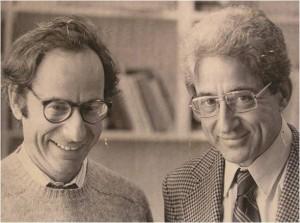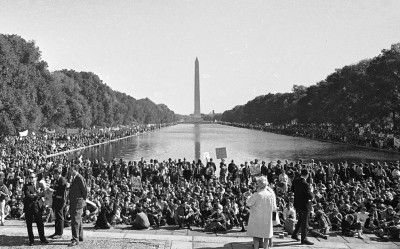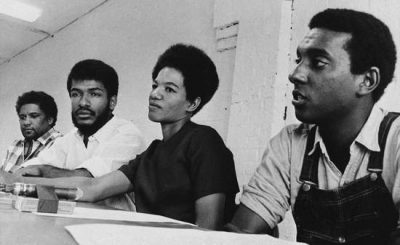Our History

Marcus Raskin and Richard Barnet
The story of IPS began at a high-powered State Department meeting of generals and defense industry executives in 1961, at the height of the Cold War. In the room were White House staffer Marcus Raskin and State Department lawyer Richard Barnet, who had joined the Kennedy Administration with hopes of systemic transformation. But after hearing the speeches and rhetoric of the officials that day, the two young public servants concluded that systemic change can only happen through the power social movements. Within two years, Raskin and Barnet had left the Kennedy Administration and founded the Institute for Policy Studies, where they could more freely “speak truth to power.”
For more than five decades, IPS scholar-activists have provided critical support for major social movements by producing seminal books, films, and articles; educating key policymakers and the general public; and crafting practical strategies in support of peace, justice, and the environment.
Since its founding by Raskin and Barnet, the organization has stood firmly on three key principles:
- Public scholarship: Only in the nexus of policy research, advocacy, and grassroots activism can ideas be turned into action.
- Independence: Speaking truth to power requires financial and programmatic independence from governmental funding and corporate influence.
- Local, National, Global: partnering with allies and social movements on the ground, IPS work operates simultaneously on the local, national, and global levels because we believe that transformation requires engagement at every level.
“IPS pioneered the modern politics of ideas in the capital. And even as conservatives were clubbing IPS, they attempted to imitate its form. The Heritage Foundation, for example, was modeled directly on IPS.” — Washington Post, 1986
Peace and Just Foreign Policy

Anti-War protesters gather by the Reflecting Pool in Washington D.C. on Oct. 21, 1967
As soon as IPS opened its doors in 1963, it plunged into the anti-Vietnam War movement. In 1965, Raskin and Associate Fellow Bernard Fall edited The Vietnam Reader, which became a textbook for teach-ins across the country. In 1967, Raskin and IPS Fellow Arthur Waskow penned “A Call to Resist Illegitimate Authority,” a document signed by dozens of well-known scholars and religious leaders that helped launch the draft resistance movement. IPS also organized Congressional seminars and published numerous books that challenged the national security state, including Gar Alperovitz’s Atomic Diplomacy and Barnet’s Intervention and Revolution. The FBI responded by infiltrating IPS with more than 70 informants, wiretapping its phones, and searching through its garbage. The Nixon Administration placed Barnet and Raskin on its “enemies list.”
In the 1980s, IPS became heavily involved in supporting the movement against U.S. intervention in Central America. IPS Director Robert Borosage and other staff helped draft Changing Course: Blueprint for Peace in Central America and the Caribbean, which was used by hundreds of schools, labor unions, churches, and citizen organizations as a challenge to U.S. policy in the region. In 1983, PBS aired Saul Landau’s exposé of the CIA’s dirty war, “Target Nicaragua,” and in 1985, several members of Congress joined an IPS press conference to release the report In Contempt of Congress: The Reagan Record of Deceit and Illegality on Central America, which documented 77 examples of false or misleading statements and violations of law by U.S. officials.
In 1991, during the first U.S. military foray in Iraq, IPS produced the pamphlet Crisis in the Gulf, which was widely used by the peace movement. Fellow Gail Christian produced a weekly IPS radio program on the war that was broadcast by three dozen public radio stations across the country.
In 2003, IPS convened the meeting that led to the formation of the country’s largest coalition against the Iraq War, United for Peace and Justice. IPS serves on the coalition steering committee and produces talking points, fact sheets, and policy documents for Congress and the peace movement on the costs of the war and how to end it justly. IPS also founded Cities for Peace, which coordinated hundreds of city council resolutions against the war and is now organizing resolutions to bring the troops home and against war in Iran. In 2007, IPS developed a detailed “Just Security” agenda that proposes non-military solutions to the core challenges of climate chaos, global poverty, nuclear weapons, terrorism, and regional wars.
Currently, our foreign policy work focuses on moving the United States away from wars and a militarized economy, and toward peace, diplomacy, and an economy that prioritizes the needs of people and the planet.
Economic and Racial Justice

Officers of the Student Nonviolent Coordinating Committee
In 1964, several leading African-American activists joined the staff and turned IPS into a base of support for the civil rights movement in the nation’s capital. Fellow Bob Moses organized trainings for field organizers of the Student Non-Violent Coordinating Council on the links between civil rights theory and practice, while Ivanhoe Donaldson initiated an assembly of African-American government officials.
In these early years, IPS was also at the forefront of the feminist movement. Fellow Charlotte Bunch organized a historic women’s liberation conference in 1966 and later launched two feminist periodicals, Quest and Off Our Backs. Rita Mae Brown wrote and published her path-breaking lesbian coming-of-age novel Rubyfruit Jungle while on the staff in the 1970s. In the early 1980s, Barbara Ehrenreich, now renowned for Nickel and Dimed and other best-sellers, led the Institute’s Women in the Economy Project. Isabel Letelier brought three dozen “Third World women” to the United States for educational tours across the country.
IPS was also on the cutting edge of the anti-apartheid movement. In 1977, it began a South Africa project that produced a series of studies and books on the subject. In 1985, Fellow Roger Wilkins helped found the Free South Africa Movement, which organized a year-long series of demonstrations that led to the imposition of U.S. sanctions.
Orlando Letelier
Ronni Moffitt
In 1976, the Institute’s destiny became irrevocably linked with the international human rights movement when agents of Chilean dictator Augusto Pinochet murdered two IPS colleagues on Washington’s Embassy Row. The target of the car bomb attack was Orlando Letelier, one of Pinochet’s most outspoken critics and the head of IPS’s sister organization, the Transnational Institute (TNI). Ronni Karpen Moffitt, a 25-year-old IPS development associate, was also killed. For more than three decades, IPS’s annual Letelier-Moffitt awards program has recognized new human rights heroes.
IPS has also worked with lawyers, Congressional allies, researchers, and activists and through the media to achieve measures of justice: the convictions of two generals and several assassins responsible for the Letelier-Moffitt murders, the declassification of U.S. documents on Chile, Pinochet’s 1998 arrest in connection with a Spanish case brought by former IPS Visiting Fellow Joan Garces, and the indictment of Pinochet by Chilean Judge Juan Guzman, a Letelier-Moffitt human rights awardee.
Building on Letelier’s work on a New International Economic Order, IPS has been a leader of economic justice movements around the world. Richard Barnet’s 1974 examination of the power of multinational corporations, Global Reach, is still required reading in many college courses, as is his follow-up book with IPS director John Cavanagh, Global Dreams (published in 1994). Cavanagh was a leader of the movement to cancel developing country debts in the 1980s, as well as the Alliance for Responsible Trade and the International Forum on Globalization in the 1990s. Through these and other networks, IPS has promoted just, sustainable trade and investment policies. Under the Bush administration, these networks have helped win important advances in debt cancellation and in scuttling plans for a hemispheric trade pact.
On the domestic front, IPS began tackling the problem of economic injustice in the late 1960s. For example, through the Appalachia Project, IPS worked with mine workers on occupational safety and health and regional economic development. In 1975, IPS initiated the Conference on Alternative State and Local Public Policies, which brought together progressive legislators to develop more equitable legislation. This work is carried on today through IPS’s Cities for Progress project, which connects local officials pursuing innovative approaches. One such measure is a Chicago bill that would set a floor for big box retail wages. Since 1994, IPS has also published an annual report on the disparity between CEO and worker pay that has garnered widespread coverage in the mainstream media and helped put the issue of economic inequality at the center of the political debate. This report has also led to the creation of other annual reports highlight worker-CEO inequality, including reports on retirement inequality and Wall Street bonus pools, and, even more importantly, helped spark local grassroots action and policy reforms.
In 2014, IPS created the Criminalization of Poverty project, focused on exposing how poor people are disproportionately punished by the criminal justice system. This groundwork sparked the creation and spin-off of a new independent journalism project called the Economic Hardship Reporting Project, led by Barbara Ehrenreich and journalist Alissa Quart. This year, the IPS program has expanded to become the Criminalization of Race and Poverty Program, to deliberately center the intersecting roles that racism and poverty play in the criminal justice system, and the juvenile justice system in particular.
Also in 2014, IPS launched the Black Worker Initiative under the leadership of IPS Associate Fellow Marc Bayard, bringing forward a vision of black women in particular as the key to the revival of the labor movement. The project began a collaboration with the National Domestic Workers Alliance focusing on black women workers in the south in 2016.
Climate Justice

Paul Jacobs and the Nuclear Gang
IPS first entered work on environmental issues through the anti-nuclear movement, a natural extension of its long history of work on the “national security state.” In 1979, IPS Fellow Saul Landau won an Emmy for his documentary “Paul Jacobs and the Nuclear Gang,” which tells the story of the cover-up by the U.S. nuclear program and of the hazards of radiation to American citizens. In 1985, Fellow William Arkin published Nuclear Battlefields: Global Links in the Arms Race, which helped galvanize anti-nuclear activism through its revelations of the impact of nuclear infrastructure on communities across America.
IPS also began to grapple with environmental problems through its work on corporate-driven globalization. In the mid-1970s, Jim Ridgeway, now a renowned investigative reporter, published The Elements, a monthly IPS newsletter on ownership and control of the world’s natural resources. Through her path-breaking work on debt and hunger, TNI Fellow Susan George exposed the environmental devastation resulting from and contributing to extreme poverty.
In the early 1990s, IPS began monitoring the environmental impacts of U.S. trade, investment, and drug policies. The Institute’s Sustainable Energy and Economy Network was the first to calculate the World Bank’s massive contributions to climate change through its support of oil, mining, and gas projects. Meanwhile the Global Economy Project has helped raise awareness of the environmental impacts of “free trade” through the popular book Field Guide to the Global Economy and other publications. The Drug Policy Project has helped bring activists and policymakers to Latin America to expose the environmental and human costs of the misguided “war on drugs.”
In the last two decades, the urgency of the climate crisis has led to an increased IPS focus on preventing environmental collapse, and working toward global climate solutions that center economic and racial justice as key elements of any policy addressing climate change. Through our fellows based both domestically and internationally, working with partners in the global south, we are developing and promoting policies that put people and the planet first — at the local, national, and global level.

